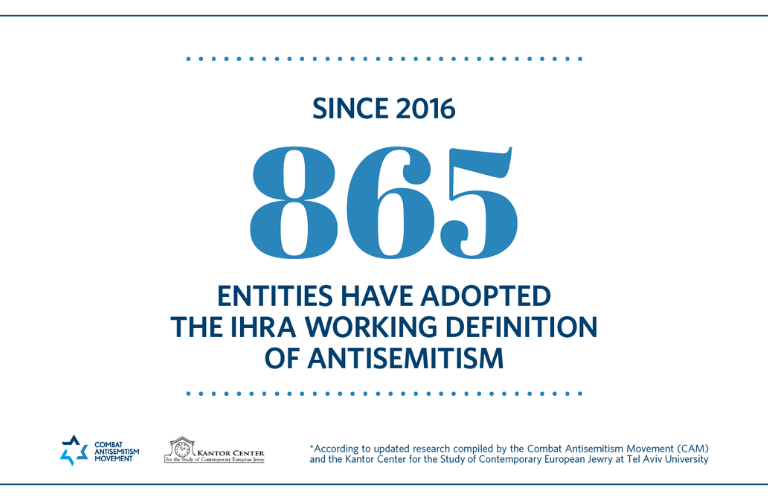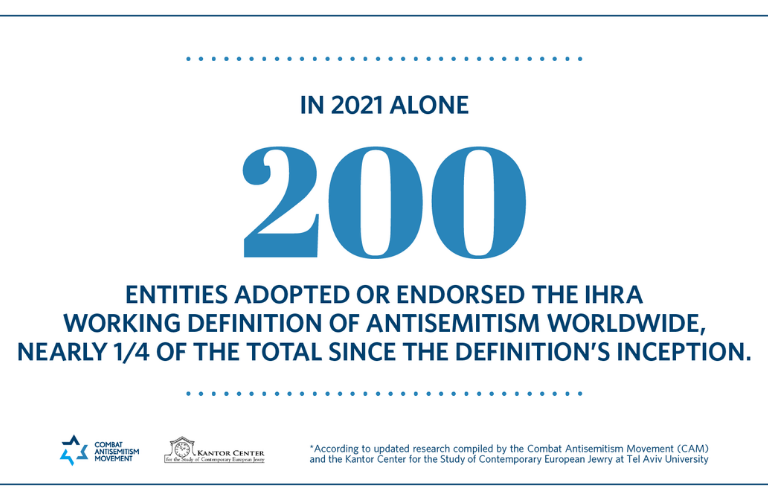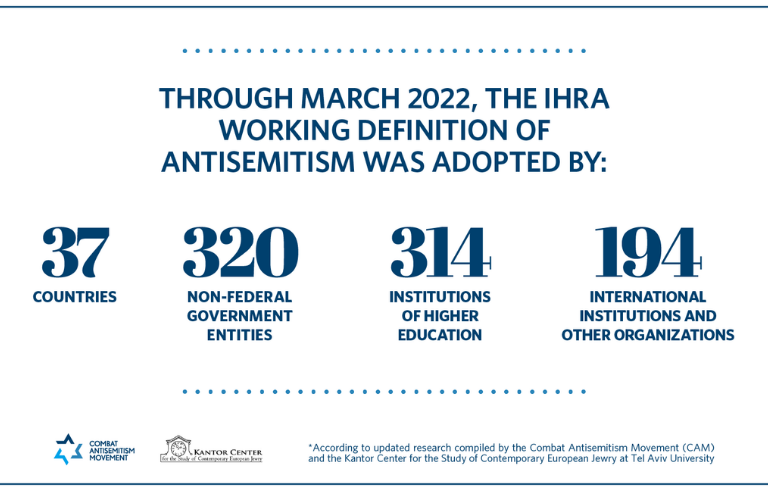

865 Entities Worldwide Have Adopted IHRA Antisemitism Definition Since 2016, Comprehensive CAM and Kantor Center Study Reveals
Some 865 entities worldwide have adopted or endorsed the International Holocaust Remembrance Alliance (IHRA) Working Definition of Antisemitism over the past six years, according to a new study published by the Combat Antisemitism Movement (CAM) and Kantor Center for the Study of Contemporary European Jewry at Tel Aviv University.
The report — which can be read in full here — is believed to be the most comprehensive compilation of data on IHRA Working Definition of Antisemitism adoptions and endorsements.
The non-legally binding definition — along with its 11 explanatory examples, details 11 specific discriminatory behaviors targeting Jews and the State of Israel — was adopted unanimously by IHRA’s 31 member states in May 2016.
“It is clear that with the marked increase in antisemitism, especially in recent years, there is a need for a universally-accepted definition of antisemitism,” CAM CEO Sacha Roytman Dratwa said. “We need to clearly delineate the borders of hate and incitement against Jews, because for too long it is the antisemites themselves who have defined them, and no other community would accept such a disturbing situation.”
“I urge those who oppose this definition to study this list and learn how governments, business, civil society and faith communities of all backgrounds around the world have united in using the IHRA’s definition as a barometer for measuring and ultimately combating contemporary forms of antisemitism,” he added. “At the same time, I urge allies of the Jewish community, institutional and at the grassroots level, to join this esteemed list by adopting the definition too.”
CAM Director of Strategic Content and International Affairs Arthur Maserjian told eJewish Philanthropy that the IHRA Working Definition of Antisemitism was the “the global standard for identifying and combating antisemitism.”
“This is the mainstream consensus and those who oppose it, I think, are outside that mainstream consensus,” he stated.
In 2021 alone, 200 international organizations, national governments, municipalities, NGOs, universities, athletic clubs, corporations, and other groups adopted or endorsed the definition — nearly 1/4 (23.1%) of the total since its inception. So far in 2022, 20 entities have adopted the definition as well, using it as a guiding framework for their antisemitism policies.
“The spate of adoptions in 2021 demonstrates clearly that there is already a steady consensus building around the IHRA Working Definition of Antisemitism, created by academics, experts and activists, so we hope more and more countries and entities will join this year,” Professor Dina Porat — Founding Head of the Kantor Center, Chief Historian of Yad Vashem, and CAM Advisory Board Member — commented. “Without a universally-accepted definition of antisemitism, the struggle against antisemitism is liable to be much more difficult to carry on.”
“As the adoption of the Working Definition of Antisemitism progresses, it becomes a value-based statement, an affirmation of standing by those who combat antisemitism and other injustices,” she pointed out. “The definition provides assistance in various areas, such as identifying instances of antisemitism, instructing police, serving as supportive material in court and encouraging discussions on fundamental issues in parliaments and universities before adoption takes place, which make it a coercive tool, without being grounded in law.”
Overall, 37 countries, including most Western democracies, have adopted the definition — 28 IHRA member states, four IHRA observer states, and five nations unaffiliated with the IHRA. Following nations such as the United States, Canada, Germany, United Kingdom, and France, among other previous adoptees, the newest additions to this group in 2021 were Australia, Estonia, Guatemala, Poland, South Korea, and Switzerland, followed by the Philippines in 2022.
A total of 320 non-federal government entities (including regional, provincial, state, county, and municipal bodies) have adopted the definition, with 39 doing so in 2021, and 13 so far in 2022. In Europe, this has included major national capitals, such as London, Paris, Berlin, Madrid, and Vienna.
Furthermore, analysis by CAM and the Kantor Center shows that when a country takes the step of adopting the IHRA Working Definition of Antisemitism at the national level, local authorities, organizations, and educational institutions follow suit.
The IHRA Working Definition of Antisemitism Worldwide Adoption & Endorsement Report can be read in full here.











